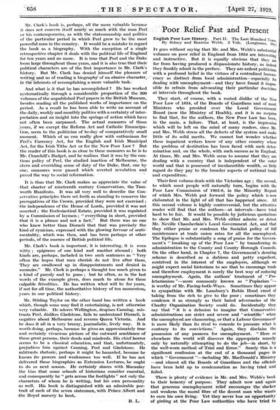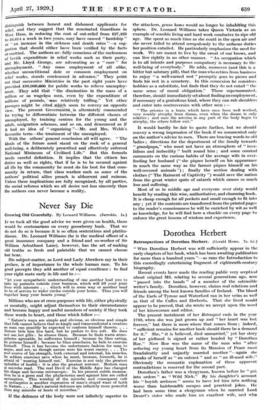Poor Relief Past and Present
English Poor Law History. Part II. The Last Hundred year By Sidney and Beat.riee Webb. 2 Vols. (Longmans. 3664 IT goes without saying that Mr. and Mrs. Webb's substantial volumes on poor relief in England from 1834 are interesting and instructive. But it is equally obvious that they are far from having produced a dispassionate history, as indeed they frankly admit in the preface. They are ardent politicians with a profound belief in the virtues of a centralized bureau- - cracy as distinct -from local administration—especially for dealing with unemployment—and they have found it impea. sible to refrain from advocating their particular doctrines at intervals throughout the book.
They start, of course, with a rooted dislike of the New Poor Law of 1834, of the Boards - of Guardians -and of most Ministers who presided over the Local Government Board (now the Ministry of - Health), and it is no surprise to find that, for the authors, the New Poor Law has been, in the main, a failure. That, at least, is the impression which will be left on the mind of many readers, since Mr. and Mrs. Webb stress all the defects of the system and make little of its solid merits. We cannot but wonder whether these impatient writers know • of any other country where the problem of destitution has been faced with such deter- mination and, on the whole, with such success as in England. At times, Mr. and Mrs. Webb seem to as-stune that they are dealing with a Country that is independent of the outer world and that is possessed of inexhaustible wealth, so little regard do they pay to the broader aspects of national trade and expenditure.
Their first volume deals with the Victorian age ; the second, to which most people will naturally turn, begins with the Poor Law Commission of 1905-8, in the Minority Report of which Mrs. Webb put forward the policy which is now elaborated in the light of all that has happened since. All this second volume is highly controversial, but the attentive reader will find that the authors—at intervals—have tried hard to be fair. It would be possible by judicious quotations to show that Mr. and Mrs. Webb either admire or detest Mr. Neville Chamberlain's Local Government Act, and that they either praise or condemn the Socialist policy of full maintenance at trade union rates for all the unemployed. The Epilogue is substantially a song of praise for the Govern- ment's " breaking up of the Poor Law " by transferring its administration to the County and County Borough. Councils. On the other hand, in Chapter 7, the Government's .derating scheme is described as a dubious and petty expedient, contrived in the interest of the employers, although we might expect social historians to see that to encourage trade and therefore employment is surely the best way of reducing unemployment. Again, the authors' treatment of " Pro- letarianism "—more commonly known as " Poplarism "— is worthy of Mr. Facing-both-Ways. Sometimes they appear to sympathize with Mr. Lansbury's Robin Hood creed of taking from the rich to give to the poor ; sometimes they condemn it as strongly as their hated adversaries of the Charity Organization Society could do. Incidentally they say that " it is a delusion to imagine that Conservative administrations are strict and severe and scientific ' when the unemployed are clamouring, or that a Labour Government is more likely than its rival to concede to pressure what is contrary to its convictions." Again, they disclaim the possession of any panacea for unemployment. " Here as elsewhere the world will discover the appropriate remedy only by naturally attempting to do the job—in short, by the well-worn method of Trial and Error." Surely this is a significant confession at the end of a thousand pages in which " Government "—including Mr. MacDonald's Ministry —and almost all the Boards of Guardians and the officials have been held up to condemnation as having tried and failed.
There is plenty of evidence in Mr. and Mrs. Webb's book to their honesty of purpose. They admit now and again that generous unemployment relief encourages the slacker and weakens the moral fibre of the decent man who wants to earn his own living. Yet they never lose an opportunity of girding at the Poor Law authorities who have tried to
distinguish between honest and dishonest applicants for relief, and they suggest that the nominated Guardians in west Hain, in reducing the cost of out-relief from £27,423 to 16,614 a week in two years, may have caused " hardship " or " an increase in the sickness and death rates "—a sug- gestion that should either have been verified by the facts or omitted. The authors are fully conscious of the uselessness of lavish expenditure in relief works such as their party, and Mr. Lloyd George, are advocating as a " cure " for unemployment. " Any mass employment of all alike, whether unconditional dole or common employment on relief works, stands condemned in advance." They point out that successive Ministries in the past eight years have provided R86,0004100 for public works to relieve unemploy- ment. They add Mit " the diminution in the mass of a million or so wageless men, even by the expenditure of millions of pounds,` was relatively trifling." Yet other passages might be cited m.14cli seem to convey an opposite view. The present Government\ is alternately commended for trying to differentiate between the different classes of unemployed, by training centres for the young and the adult, emigration schemes, and so on, and denounced as if it had no idea of " organizing "—Mr. and Mrs. Webb's favourite term—the treatment of the unemployed.
With the uthors' general conclusion all will agree. The Ideals of the future must stand on the rock of a general well-being, a deliberately prescribed and effectively enforced National Minimum of Civilized Life." But this formula needs careful definition. It implies that the citizen has duties as well as rights, that if he is to be secured against all ills by the community he must do his best for that com- munity in return, that class warfare such as some of the authors' political allies preach is abhorrent and ruinous. Unless these implications are fully recognized, by all parties, the social reforms which we all desire not less sincerely than the authors can never become a reality.









































 Previous page
Previous page